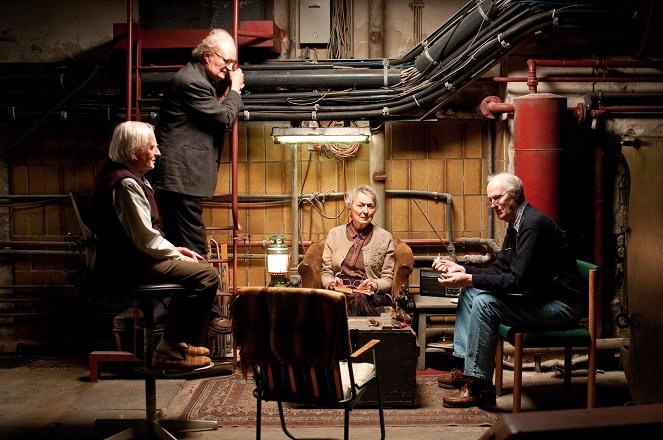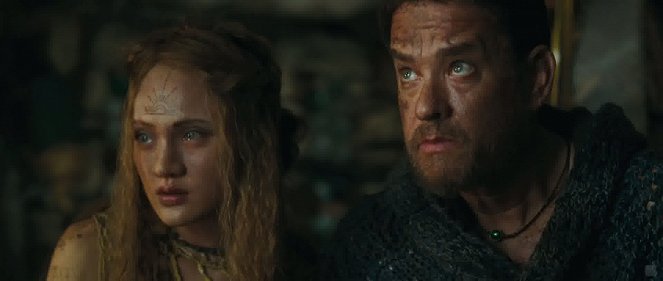VOD (3)
Plots(1)
Six stories spanning centuries. One soul. Tom Hanks and Halle Berry lead an all-star cast in interwoven tales as time shifts between past, present and future. As characters reunite from one life to the next, their actions generate consequences: A killer evolves into a hero. An act of kindness inspires a revolution. Cloud Atlas combines science fiction, drama, mystery, action and romance into a film that’s utterly, wonderfully epic. (Warner Bros. Home Entertainment)
(more)Videos (35)
Reviews (18)
At first I was disgruntled by the constant jumping between storylines (sometimes after just a few seconds) and mixing of incompatible genre elements, where you’ll see Amistad costumes right next to Star Trek masks, but then my chagrin changed to wonder over this exceptional work. It has a complex narrative and is spiritually deep and innovative in the filmmaking aspect, with bold production. In a flood of thoughts about life and the timeless suffering of humanity, presented through fairy-tale poetics, dogs are shot, throats are cut and toes are sucked. And women play men and men play women. An epic ocean of breathtaking emotional moments that simply cannot be absorbed in all contexts at first viewing. A beautiful Halle Berry and demonic Hugo Weaving. A great risk on the part of the investors. Second and third viewings are necessary, so my rating is only preliminary.
()
This was a loss. A bold and extremely imaginative, variable and deep book transplanted into a dynamic and agile network that does not raise questions, but answers didactically. In addition, the film helps itself with the hackneyed new age symmetries that we know intimately from The Fountain, but also from Mr. Nobody - if you do not know how to connect remote storylines, fateful love is the answer. In addition, the film adds to it the typical pathetism of all-encompassing mysticizing concepts such as Eternity, Infinity, Reincarnation, Destiny, and if the viewer does not happen to get it, one of the characters will literally repeat it 4 times. The result is a completely uninteresting and mechanical work for me, which fails even in moments that I considered "laid" - the 5th story of Sonmi in the book is a poignant picture of capitalist-fascist-totalitarian dystopia, in which rebellion is only a prefabricated part of the consumerist chain. That's terribly little. Compared to The Matrix trilogy, the virtuoso Speed Racer or Tykwer's "gender-deconstruction" Three, this is more of a Junk Atlas.
()
A cinematically bold space-time meta kitsch epic which unnecessarily shows off by misusing a minimum of actors in a maximum number of roles; which, thanks to their latex faces when characters are cast regardless of the sex or color of the actor is more reminiscent of Inspector Clouseau than anything else (the influence of Lana Wachowski?). Not even the imbalance between the separate segments (Tykwer > Wachowskis) is something to jump for joy for. And it mainly lacks catharsis. The creators say want to say along the way and so there’s nothing left at the finale. Even despite these errors in the matrix, NASA could send a dvd with this picture to the stars without any qualms, and this might help potentially intelligent life forms to get a good idea “about us". And they might choose to give us a very wide berth.
()
SIX IN ONE. I didn’t want to write an overly celebratory comment right after leaving the cinema, and I decided to let the experience brew for a day, and the result? I’m still so excited! Cloud Atlas is the best film in at least a couple of years, but also a category on its own that can not be properly compared with any other. Amazing! I can’t understand how the Wachowskis and Tykwer managed to simultaneously tell six mostly conversational stories with different styles and genres (historical drama, tragic romance, journalist investigation, black comedy, dystopian sci-fi, and post-apocalyptic sci-fi) in a way that the whole lot sticks together (actually, Cloud Atlas can’t be seen in any other way than as a whole), and where everything is clear and running smoothly, and on top of that, its three hour run feels like an action ride, instead of a confusing and dry arthouse flick. Its message may not be revolutionary or original, but who cares in this case? Or do we now expect every film to come out with its own ontological system? In any case, the ending is very effective, it brings together the climax of six stores – it’s about half an hour long (six times five minutes). Half an hour of goosebumps :) … In short, the Wachowskis and Tykwer met the expectations I had set for them (which this year Scott and Nolan couldn’t do), and at the same time they were able to surprise me with how quickly the film goes (some ninety minute films feel longer than this three hour monument), and mainly because it’s a lot more viewer-friendly than I expected. The attentive viewer won’t get lost and the receptive viewer will absorb, they only need to go a little against the flow. But more viewings will of course be necessary for even better details, and I’m already looking forward to them. 100 %
()
Cloud Atlas is definitely a stimulating film, but I’m not sure what the directors’ primary intention was. I most enjoyed seeing how the all-encompassing favouritism towards minorities is related to the conventions of individual genres. Melodrama from the artistic environment was ascribed to homosexual romance, the main protagonists of an originally white paranoid thriller are a black female reporter and her partner, who were seemingly pulled out of a blaxploitation action flick. None of the genres employed in the film is entirely “pure” – the comedy is permeated with an escape movie, the thriller makes room for black humour – as the filmmakers acknowledge their own post-modern framing of the book on which the film is based, i.e. a point of view that doesn’t belong to any of the characters. Cloud Atlas is fine in its analysis of post-modern genre deconstructions, but it fails on a more basic level. I found the flat characters to be uninteresting. Contemplating who was hidden behind the mask was more entertaining to me than the acting. The six worlds are equally artificial, intended only for conveying certain transpersonal ideas. They are worlds for the camera, without a life of their own. So that we don’t doubt that one of the levels plays out in the 1970s, almost every exterior shot includes a car typical of the era (e.g. a Ford Mustang). The film fails to grip the viewer or offer a concentrated emotional experience. Taken together, the actions set in different time-space continua do not form a powerful sequence; on the contrary, they get in each other’s way and make it impossible for individual scenes to resonate. If the intention was to make it difficult for viewers to deal with the fact that the stories are fragmented and in no way interconnected, what need is there for the constant creation of banal thematic and graphic (and, to a lesser extent, symbolic) parallels? At least the similarity of the stories shouldn’t be so obvious and constantly emphasised through the off-screen commentary by one of the many narrators. Insufficient use of the fact that most of the stories are told by someone, in the form of a diary, a letter or a book, from the position of an interrogated prisoner or a respectable elder, represents another promise that the film makes and yet fails to develop (we only hear the narrators’ voices; otherwise, they remain unseen and do not actively get involved in the narrative, nor are they ever interrupted as it unfolds). Whatever the artistic intention may have been, which is not made very clear at all by the commercial rendering of the whole project, Cloud Atlas seemed to me like constantly interrupted intercourse without a proper climax. In exchange for the attention that I invested, and which had nothing to fixate on in places, I expected a more valuable reward than a message along the lines of “we have to help each other”, which I found to be ridiculous coming from a film that wants to break down conventions. 70%
()
Gallery (188)
Photo © Warner Bros. Pictures / Reiner Bajo, Jay Maidment



Ads